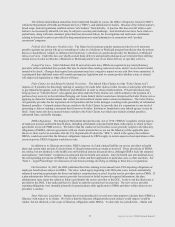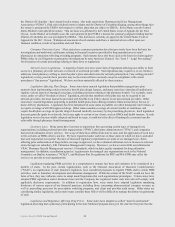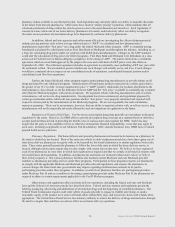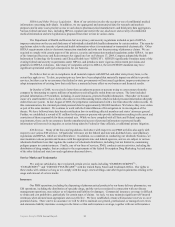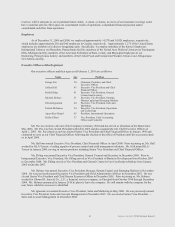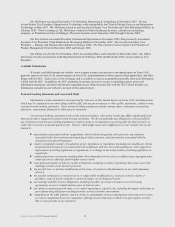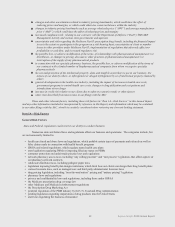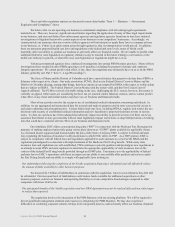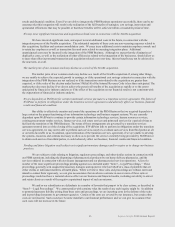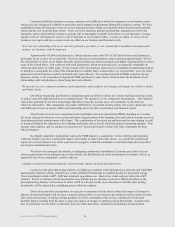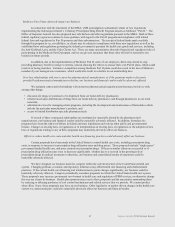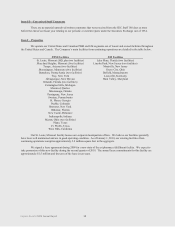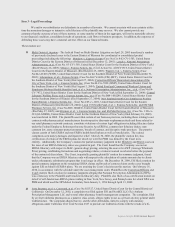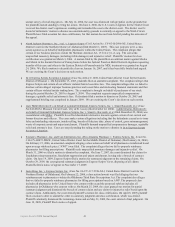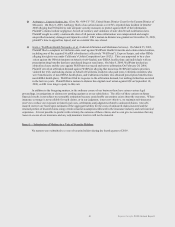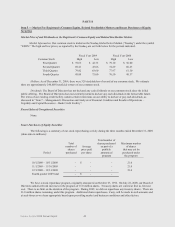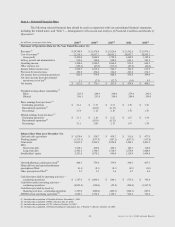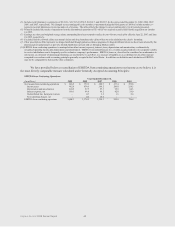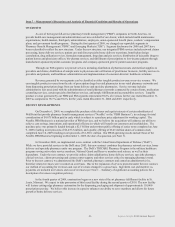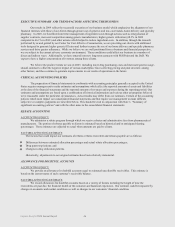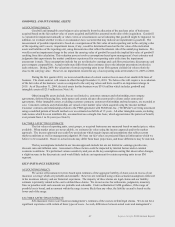Express Scripts 2009 Annual Report Download - page 39
Download and view the complete annual report
Please find page 39 of the 2009 Express Scripts annual report below. You can navigate through the pages in the report by either clicking on the pages listed below, or by using the keyword search tool below to find specific information within the annual report.
Express Scripts 2009 Annual Report
37
Medicare Part D may adversely impact our business.
In connection with the enactment of the MMA, CMS promulgated a substantial volume of new regulations
implementing the federal government’s Voluntary Prescription Drug Benefit Program, known as Medicare “Part D.” The
Office of Inspector General has also proposed new safe harbors and other regulations pursuant to the MMA. Both of these
federal regulatory agencies continue to issue guidance with regard to the Part D program and compliance with related
federal laws and regulations by Part D sponsors and their subcontractors. The receipt of federal funds made available
through this program by us, our affiliates, or clients may be subject to compliance with these new regulations as well as the
established laws and regulations governing the federal government’s payment for health care goods and services, including
the Anti-Kickback Laws and the False Claims Act. There are many uncertainties about the financial and regulatory risks of
participating in the Medicare Part D program, and we can give no assurance that these risks will not be material to our
business in future periods.
In addition, due to the implementation of Medicare Part D, some of our employer clients may decide to stop
providing pharmacy benefit coverage to retirees, instead allowing the retirees to choose their own Part D plans, which could
result in us losing members. Extensive competition among Medicare Part D plans could also result in the loss of Medicare
members by our managed care customers, which would also result in a decline in our membership base.
If we lose relationships with one or more key pharmaceutical manufacturers or if the payments made or discounts
provided by pharmaceutical manufacturers decline, our business and financial results could be adversely affected.
We maintain contractual relationships with numerous pharmaceutical manufacturers that may provide us with,
among other things:
• discounts for drugs we purchase to be dispensed from our home delivery pharmacies;
• rebates based upon distributions of drugs from our home delivery pharmacies and through pharmacies in our retail
networks;
• administrative fees for managing rebate programs, including the development and maintenance of formularies which
include the particular manufacturer’s products; and
• access to limited distribution specialty pharmaceuticals.
If several of these contractual relationships are terminated or materially altered by the pharmaceutical
manufacturers, our business and financial results could be materially adversely affected. In addition, formulary fee
programs have been the subject of debate in federal and state legislatures and various other public and governmental
forums. Changes in existing laws or regulations or in interpretations of existing laws or regulations or the adoption of new
laws or regulations relating to any of these programs may materially adversely affect our business.
Efforts to reduce health care costs and alter health care financing practices could adversely affect our business.
Certain proposals have been made in the United States to control health care costs, including prescription drug
costs, in response to increases in prescription drug utilization rates and drug prices. These proposals include “single-payer”
government funded health care, and price controls on prescription drugs. If these or similar efforts are successful or if
prescription drug utilization rates were to decrease significantly, whether due to a reversal in the growing role of
prescription drugs in medical treatment or otherwise, our business and consolidated results of operations could be
materially adversely affected.
We have designed our business model to compete within the current structure of the United States health care
system. Changing political, economic and regulatory influences may affect health care financing and reimbursement
practices. If the current health care financing and reimbursement system changes significantly, our business could be
materially adversely affected. Congress periodically considers proposals to reform the United States health care system.
These proposals may increase government involvement in health care and regulation of PBM services, or otherwise change
the way our clients do business. Health plan sponsors may react to these proposals and the uncertainty surrounding them
by reducing or delaying purchases of cost control mechanisms and related services that we provide. We cannot predict
what effect, if any, these proposals may have on our business. Other legislative or market-driven changes in the health care
system we cannot anticipate could also materially adversely affect our business and financial results.


